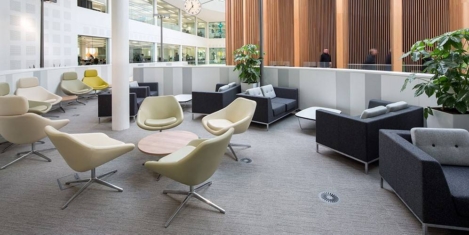February 4, 2017
UK public sector property programme to ‘deliver billions to public purse’ 0
 The UK government has reduced the public sector property estate by over 300,000 square metres delivering savings of £176 million in the last financial year, according to the latest State of the Estate report from the Cabinet Office. Speaking yesterday at the 2017 Government Property Conference, Minister for the Constitution Chris Skidmore announced that since 2010, rationalisation of the estate has reduced its size by a quarter, delivering over £1 billion in running costs. The sale of surplus properties, including Admiralty Arch (pictured) and the Old War Office, resulted in a further £1 billion in capital receipts in 2015-16 – a notable step towards the pledge to deliver £5 billion in receipts by 2020. The report shows that vacant space within the central government estate now only represents 1.4 percent – well below the average in the private sector of 8.9 percent.
The UK government has reduced the public sector property estate by over 300,000 square metres delivering savings of £176 million in the last financial year, according to the latest State of the Estate report from the Cabinet Office. Speaking yesterday at the 2017 Government Property Conference, Minister for the Constitution Chris Skidmore announced that since 2010, rationalisation of the estate has reduced its size by a quarter, delivering over £1 billion in running costs. The sale of surplus properties, including Admiralty Arch (pictured) and the Old War Office, resulted in a further £1 billion in capital receipts in 2015-16 – a notable step towards the pledge to deliver £5 billion in receipts by 2020. The report shows that vacant space within the central government estate now only represents 1.4 percent – well below the average in the private sector of 8.9 percent.





























 Amos Tversky and Daniel Kahneman introduced the concept of Loss Aversion in 1984, highlighting people’s tendency to strongly prefer avoiding losses to acquiring gains. Most studies suggest that losses are twice as powerful, psychologically, as gains. Lose £100 and we will feel a remorse that easily outweighs winning £100. In a similar fashion we find it very hard to see future positives when confronted with short term loses. We understand easily what we have lost but cannot imagine what there is to be gained. Furthermore, as Frederic Bastiat wrote in an 1850 paper, “That Which is Seen, and That Which is Not Seen”, man has a tendency to “pursue a small present good, which will be followed by a great evil to come, rather than a great good to come, at the risk of a small present evil”. Put these together and it is no wonder that, by and large, the future of work, corporate real estate and the workplace is so widely misunderstood.
Amos Tversky and Daniel Kahneman introduced the concept of Loss Aversion in 1984, highlighting people’s tendency to strongly prefer avoiding losses to acquiring gains. Most studies suggest that losses are twice as powerful, psychologically, as gains. Lose £100 and we will feel a remorse that easily outweighs winning £100. In a similar fashion we find it very hard to see future positives when confronted with short term loses. We understand easily what we have lost but cannot imagine what there is to be gained. Furthermore, as Frederic Bastiat wrote in an 1850 paper, “That Which is Seen, and That Which is Not Seen”, man has a tendency to “pursue a small present good, which will be followed by a great evil to come, rather than a great good to come, at the risk of a small present evil”. Put these together and it is no wonder that, by and large, the future of work, corporate real estate and the workplace is so widely misunderstood.








January 20, 2017
The facts about sit stand work are already lost in the stream of narrative 0
by Mark Eltringham • Comment, Knowledge, Wellbeing, Workplace design
(more…)